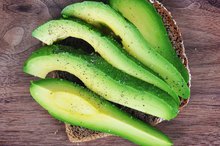Can Certain Foods Prevent Blood Clots?
In order to reduce the risk of thrombosis, or internal blood clots, individuals should follow a diet that is low in saturated fats, high in fiber, and rich in fruits and vegetables. Some specific foods have blood-thinning properties, thus helping to prevent the formation of blood clots.
Salicylates
Salicylates are compounds that inhibit blood clotting. Aspirin contains such compounds; however, a number of natural foods are rich in salicylates. Herbs and spices rich in this substance include curry, cayenne, paprika, thyme, turmeric, ginger, licorice and peppermint. Fruits high in salicylates include strawberries, oranges, grapes, raisins, prunes, blueberries and cranberries. Other food items high in salicylates include wine, vinegar, honey and cider.
- Salicylates are compounds that inhibit blood clotting.
- Other food items high in salicylates include wine, vinegar, honey and cider.
Omega- 3 Fatty Acids
What Fruits & Vegetables Are Excellent for Thinning the Blood?
Learn More
Omega-3 fatty acids have blood-thinning properties, which help prevent strokes. Fatty fish is the main source of omega-3s and are found in anchovies, salmon, lake trout, herring and mackerel. Fish oil is also a rich source of omega-3s. Plant sources of omega-3s are flaxseed, sunflower seeds, canola oil, corn oil, safflower oil and soy. A 2007 study published in “Atherosclerosis” found that supplementation with 1.8g of omega-3s daily for two years led to a significant improvement in blood flow together with a decreased thickness of the arteries.
- Omega-3 fatty acids have blood-thinning properties, which help prevent strokes.
- Plant sources of omega-3s are flaxseed, sunflower seeds, canola oil, corn oil, safflower oil and soy.
Vitamin E
Vitamin E, which is a blood thinner, is found in nuts such as walnuts, almonds and hazelnuts; vegetable oils such as canola oil, sunflower oil and palm oil; and in lentils such as chickpeas; oats; and wheat. A 2009 article in the “British Journal of Biomedical Science” discusses the blood-thinning effect of red palm oil together with other cardiovascular benefits of this oil, including inhibition of endogenous cholesterol synthesis, a reduction in oxidative stress and a reduction in blood pressure.
Alcohol
Is Acai Berry Safe While on Blood Thinners?
Learn More
Alcohol is a potent blood thinner. The mechanism of this appears to be via a reduction in platelet aggregation; reduction of fibrinogen levels, which is a blood clotter; and increasing fibrinolysis, the process by which clots dissolve. These, and other heart-related benefits of red wine, are discussed in detail in a 2010 article in "Seminars in Thrombosis and Hemostasis."
Foods to Avoid
Foods rich in vitamin K encourage blood clots and should be avoided by people susceptible to thrombosis. Foods rich in vitamin K include the green leafy vegetables such as kale, spinach, broccoli, lettuce and asparagus and some fruits, such as peaches and bananas.
Related Articles
References
- “Seminars in Thrombosis and Hemostasis”; Moderate Red Wine Consumption and Cardiovascular Disease Risk: Beyond the "French Paradox"; G. Lippi et al.; February 2010
- “Atherosclerosis”; Eicosapentaenoic Acid Reduces the Progression of Carotid Intima-Media Thickness in Patients With Type 2 Diabetes; T. Mita et al.; March 2007
- “British Journal of Biomedical Science”; Red Palm Oil: Nutritional, Physiological and Therapeutic Roles in Improving Human Well-Being and Quality of Life; O.O. Oguntibeiu et al.; March 2009
Writer Bio
Manuel Attard has been writing professionally since 2009 and has written nutrition articles for the Malta Exercise, Health and Fitness Association. He is a Registered Nutritionist (U.K.) and a CYQ qualified fitness instructor. Attard has an honors Bachelor of Science in biology and chemistry from the University of Malta and a Master of Science in human nutrition from the University of Glasgow.








